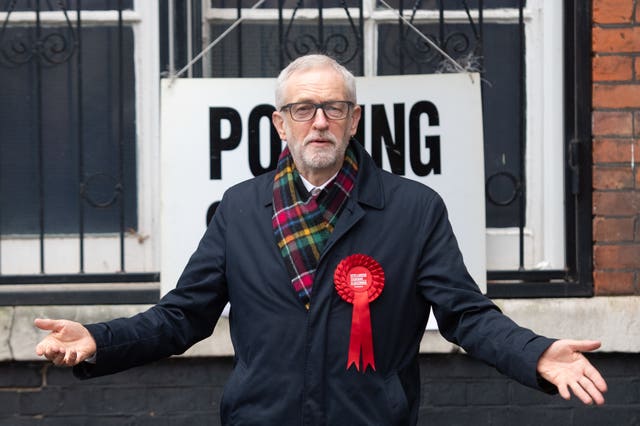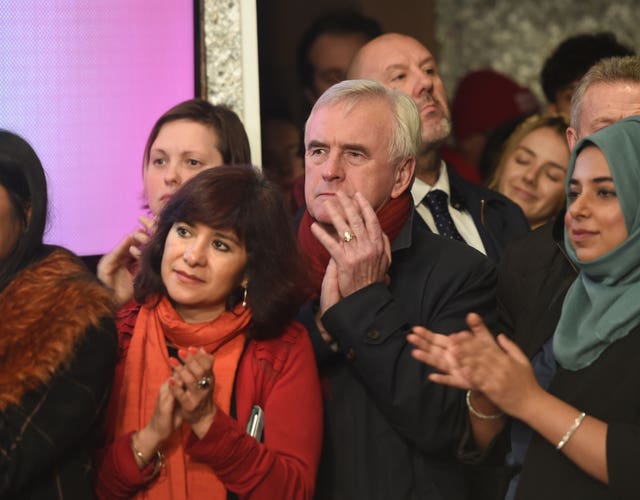
Boris Johnson’s gamble on a snap election looked to have paid off handsomely as he headed for a landslide General Election victory.
The Tories snatched seat after seat in Labour heartlands as the PM’s ‘get Brexit done’ election message hit home with working class Leave voters.
A BBC/Sky/ITV exit poll put the Tories on 368 seats and was borne out by early results as support for Labour slumped in its Brexit-voting heartlands.
The exit poll predicted Labour would win just 191 seats, the Scottish National Party 55, Liberal Democrats 13, the Brexit Party none, Plaid Cymru three and Greens one.
This would give Mr Johnson a majority of 86.
The pound soared against the dollar and the euro as the exit poll emerged.
One of the first actual results to come through supported the exit poll prediction as the Conservatives won Blyth Valley with a 10% swing from Labour – a seat they had held since 1950.
The first big Labour scalp claimed by the Tories was shadow environment secretary Sue Hayman, who lost Workington on another 10% swing.
The typically working class ‘Workington Man’ voter was identified as a key target by a right wing think tank at the start of the election campaign.
The Tories also took Darlington from Labour.
Labour’s Gareth Snell predicted his own defeat ahead of the result in another former stronghold, Stoke-on-Trent Central, telling PA: “I’m going to lose badly and this is the start of 20 years of Tory rule.”
Like Blyth Valley, Stoke Central has been Labour since 1950
Labour's performance since 1935. pic.twitter.com/Ky4C7H9nZL
— Ian Jones (@ian_a_jones) December 13, 2019
Sources in other Labour heartland seats including Wrexham and Bishop Auckland were also predicting Tory gains. Bishop Auckland has been Labour since 1935.
Jeremy Corbyn’s party clung onto several North East seats including Newcastle Central, Sunderland Central, Newcastle-upon-Tyne East and Houghton and Sunderland South, but with much reduced majorities.
But the slump in support in working class seats will put huge pressure on the Labour leader, with Mr Snell among those calling for him to quit.
He said: “It’s all well and good saying we’ve made some gains here or we’ve managed to keep the Lib Dems at bay there, the fact is in Stoke on Trent we’re going to have another five years of Tory government, probably with three Conservative MPs.
“And the damage and the untold horrors they will unleash in Stoke on Trent I believe lies firmly at the door of those running the national party’s campaign and the decisions they have made about where to target and the sort of Brexit response they should have.”
Thank you to everyone across our great country who voted, who volunteered, who stood as candidates. We live in the greatest democracy in the world. pic.twitter.com/1MuEMXqWHq
— Boris Johnson (@BorisJohnson) December 12, 2019
The Prime Minister greeted the poll by tweeting: “Thank you to everyone across our great country who voted, who volunteered, who stood as candidates.
“We live in the greatest democracy in the world.”
Despite a major push by Labour, Mr Johnson looked set to retain his own Uxbridge and South Ruislip seat, with one Tory source saying: “He will not lose.”
Mr Johnson entered the election without a majority, having just 298 Tory MPs, after some quit the party and he withdrew the whip from others when they rebelled over Brexit.
If the exit poll proves to be accurate, Mr Johnson will return to Number 10 on Friday in a position to easily drive through his Brexit deal and take the UK out of the European Union next month.
The result, the largest majority for a Conservative leader since Margaret Thatcher in the 1980s, would be seen as a triumph for his tightly-controlled campaign, which was largely gaffe-free until the final week.

The outcome would, however, be a huge set-back for Labour leader Mr Corbyn.
Labour, who had 243 MPs when Parliament was dissolved last month, is forecast to lose 52 seats.
Such a poor result would be the worst for Labour in terms of seats since 1935 and would put extreme pressure on Mr Corbyn to stand down after losing a second General Election in a row.
The future of the Lib Dem leader Jo Swinson also appeared uncertain, with the joint leader of East Dunbartonshire council saying “it is on a knife edge” whether she will lose her seat to the SNP.
Jon Lansman, boss of the Corbyn-supporting Momentum campaign group, said he did not think the Labour leader would “overstay his welcome”.
Shadow chancellor John McDonnell said the exit poll was “extremely disappointing”.

And shadow international trade secretary Barry Gardiner said it represented a “devastating result for us” and “all the people who were really needing a Labour victory to improve their lives”.
Asked if his party needed a new leader, Mr Gardiner said: “These are things that will be discussed by the leadership of the party in the next few days.”
But other Labour figures went further.
Ian Murray, fighting to hold on to his Edinburgh South seat, said: Every door I knocked on, and my team and I spoke to 11,000 people, mentioned Corbyn.
“Not Brexit but Corbyn. I’ve been saying this for years. The outcome is that we’ve let the country down and we must change course and fast.”
Every door I knocked on, and my team and I spoke to 11,000 people, mentioned Corbyn. Not Brexit but Corbyn. I’ve been saying this for years. The outcome is that we’ve let the country down and we must change course and fast.
— Ian Murray (@IanMurrayMP) December 12, 2019
Exeter candidate and former Labour minister Ben Bradshaw said: “Among every voting group the overwhelming negative for us was the leadership, not Brexit.”
We in @exeterlabour probably spoke to more voters than any other CLP in this campaign. We have the data. Among every voting group the overwhelming negative for us was the leadership, not #Brexit. #GE2019
— Ben Bradshaw (@BenPBradshaw) December 13, 2019
Speaking on ITV, former Labour Home Secretary Alan Johnson attacked the party’s “student politics” under the current leadership, adding: “Corbyn was a disaster on the doorstep. Everyone knew that he couldn’t lead the working class out of a paper bag.”
Julie Elliott, who retained Sunderland Central for Labour, said it had been a disastrous evening for the party and it must change.
In her victory speech, after seeing her 2017 majority of 9,997 reduce to 2,964 over the Tory candidate, she said: “The party I have been a member of for 35 years has let the country down by not being good enough to win against this awful Tory government.
“People on the doorstep have repeatedly said to me they cannot vote for this party.
“They will come back to us if we become a radical party for change on the centre-left ground which is where we win elections.
“I will play my part… the country needs a Labour government.”


Comments: Our rules
We want our comments to be a lively and valuable part of our community - a place where readers can debate and engage with the most important local issues. The ability to comment on our stories is a privilege, not a right, however, and that privilege may be withdrawn if it is abused or misused.
Please report any comments that break our rules.
Read the rules here